“When all the prisoners of the land are crushed under foot, when human rights are perverted in the presence of the Most High, when one’s case is subverted–does the Lord not see it?” (Lamentations 3:34-36)
NEWS
1) First District Church of the Brethren in India celebrates 100th Jilla Sabha
2) Nigeria Crisis Response staff provide details of the relief effort
3) New Humanitarian Pledge to ban nuclear weapons advances as troubled treaty stalls
FEATURE
4) Breaking the chains: A reflection from Ecumenical Advocacy Days
5) Brethren bits: Remembering Gerald Neher, new ADNet staff, Brethren Academy seeks coordinator of Spanish-language programs, Bethany courses at Brethren-related colleges, “After Christendom” webinar, more.
ANNUAL CONFERENCE REGISTRATION REMINDER: Wednesday, June 10, is the last day for housing reservations and online registration for the 2015 Annual Conference in Tampa, Fla., on July 11-15. After June 10, on-site registration will be available in Tampa prior to the start of the Conference, for an additional fee. Register now at www.brethren.org/ac .
A NOTE TO READERS: Today’s Newsline is an abbreviated issue due to unforeseen circumstances that are keeping the editor out of the office this week. Upcoming issues will feature a report from the leadership conference sponsored by the district executives, a review of financial results for the denomination in 2014, news of recent Global Food Crisis Fund grants and Emergency Disaster Fund grants, and more.
1) First District Church of the Brethren in India celebrates 100th Jilla Sabha
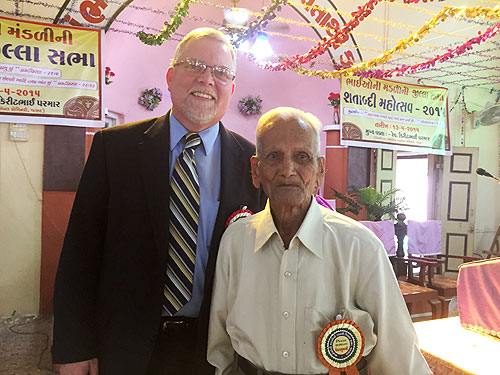
M.M. Gameti (at right) posed for a picture with then-Annual Conference moderator David Steele, during Steele’s visit to the church in India. This picture originally was captioned, “Two moderators,” because at the time Gameti was serving as moderator of the First District Church of the Brethren in India.
By Jay Wittmeyer
Indian Brethren gathered in Valsad, Gujarat, for the church’s 100th Jilla Sabha (district conference). The two-day event began on May 13 with worship and the regular business of the denomination, while May 14 was dedicated to a full day of celebration that ran late into the evening. Attending on behalf of the Church of the Brethren was David Steele, moderator, and Jay Wittmeyer, executive director of Global Mission and Service.
The First District, under the leadership of Brethren missionary Wilbur Stover, held its first conference in 1901, and its 69th in 1970, when the First District (Gujarat) and the Second District (Maharashtra) joined five other communions to form the unified Church of North India. After an interim period, the First District Brethren resumed meeting as the First District Church of the Brethren and was recognized as such by the Church of the Brethren Annual Conference in 2003. The Second District, which only had four churches at the time of unification, has continued with CNI.
A significant matter for the 100th Jilla Sabha was the recognition of Ahwa into the Church of the Brethren denomination. The mission of Ahwa began in 1907 and its current church building was constructed in 1933. Located in the tribal hill region of Dang, the Ahwa congregation was formerly with the Church of North India but decided it was more suited to fellowship with the First District Church of the Brethren.
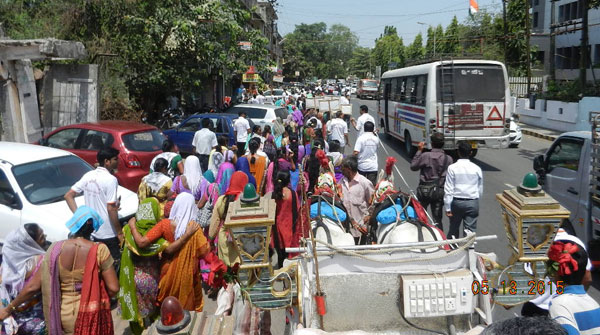
Day of celebration for the First District Church of the Brethren began with this procession, some 1,000 strong, that paraded through the city.
Maganlal Gameti, now 101 years of age, was elected to serve as moderator of the First District, mainly as a means to honor his years of ministry. “I am not worried about taking on such a role at my age,” Brother Gameti said. “Many will give me whatever assistance I require.”
The day of celebration began with a 1,000-person parade through the city of Valsad that included a truck full of speakers for music and a horse-drawn carriage for the US guests. The parade stopped periodically for singing and dancing as it weaved its way through various parts of town, finishing at the Valsad church for an afternoon feast and worship service. The evening featured a historical slide show by Gabriel Jerome on a large outdoor screen, followed by fireworks and a cultural program on a large stage.
I reminded the community of the analogy Wilbur Stover often used to describe the Indian church. The church is like a Banyan tree, Stover would say. When he tried to plant a Banyan log in his front yard, people criticized him because it was not the monsoon season. “Even so,” Stover said, “with patience and careful watering, I can get the tree to grow.” The tree still stands in Valsad to this day.
With careful patience and watering, First District Church of the Brethren now reached its 100th annual meeting. Something to be celebrated.
— Jay Wittmeyer is executive director of Global Mission and Service for the Church of the Brethren.
2) Nigeria Crisis Response staff provide details of the relief effort
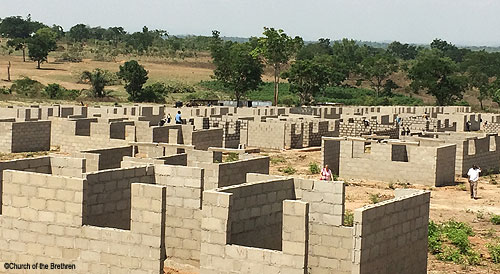
New homes under construction in Nigeria
Church of the Brethren staff working with the Nigeria Crisis Response have provided financial details and accounting of the relief effort in Nigeria, which responds to needs of those affected by the violent Islamist insurgency in the northeast of the country. The crisis response is a cooperative effort of the Church of the Brethren and Ekklesiyar Yan’uwa a Nigeria (EYN, the Church of the Brethren in Nigeria).
Brethren Disaster Ministries has issued an appeal for $5.3 million to fund two years of the effort. Carl and Roxane Hill, co-directors of the Nigeria Crisis Response and Global Mission and Service staff, have provided a detailed accounting of the $1,031,086 spent as of April 15, and what has been accomplished with that money.
The Nigeria Crisis Response is funded through generous donations from Brethren congregations and individuals, ecumenical partners, and other groups and individuals. As of April 15, donations amounted to $1,299,800.51. When added to the $1.5 million in “seeds funds” designated by the Church of the Brethren Mission and Ministry Board out of denominational reserves and existing monies in the Emergency Disaster Fund, the total comes close to $2.8 million.
Other partners in the work in Nigeria are Mission 21, which recently signed a memorandum of understanding regarding its participation; and Mennonite Central Committee, whose Nigeria staff are providing training for trauma healing workshops in partnership with EYN. Christian Aid Ministries is another US-based organization helping to fund the work in Nigeria, working through the Church of the Brethren to aid EYN.
The Church of the Brethren also is partnering with and supporting several Nigerian NGOs including the Center for Caring, Empowerment, and Peace Initiatives (CCEPI), which is led by Rebecca Dali, wife of EYN president Samuel Dali; Lifeline Compassionate Global Initiatives (LCGI), led by EYN staff liaison Markus Gamache; Women and Youth Empowerment for Advancement and Health Initiative (WYEAHI), which helps displaced people find new livelihoods; and Favored Sisters Christian Foundation (FSCF), which works to educate displaced children.
Brethren Disaster Ministries estimates that although the current appeal for the Nigerian Crisis Response is for two years, the work will be of much longer duration.
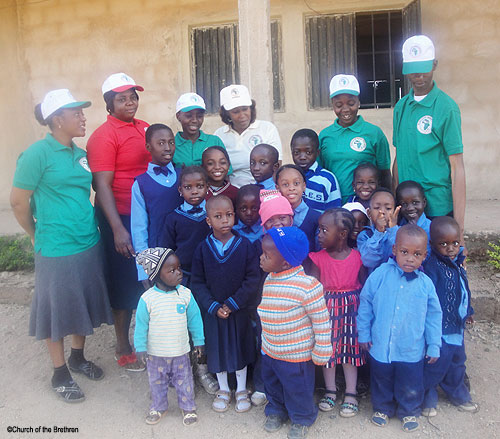
Expenditures
As of April 15, the Nigeria Crisis Response program has spent $1,031,086:
— $387,558 to provide shelter for 3,000 displaced families, representing 24,000 people
— $205,621 to provide 2-3 months of food and supplies for 10,000 at-risk families
— $14,634 to support peacebuilding, trauma healing, and resiliency among displaced people
— $78,016 to support livelihoods and economic empowerment for 1,000 families
— $77,111 to support the education of 5,000 displaced children
— $226,209 to support and strengthen EYN as a church, including obtaining housing for displaced church staff and leadership and renovating and re-roofing an EYN headquarters annex in central Nigeria
— $88,842 to support Nigerian relief staff and help provide vehicles, office, and equipment
— $23,674 for new initiatives and other expenses
Accomplishments
Staff note a number of accomplishments of the effort so far, which has included the purchase of three large pieces of land to build care centers where people displaced from northeast Nigeria may relocate in central Nigeria.
At these care center sites, bore holes have been dug to provide water, some of the land has been cleared, 56 shelters are completed, and families have moved in. Foundations have been laid for an additional 40 structures. In addition, new interfaith communities are being developed where Christians and Muslims are living side by side.
Distributions of food and household supplies have taken place at more than 25 sites, giving aid to more than 20,000 people who are displaced within Nigeria. In addition, some assistance has been provided to the more than 12,000 EYN members who are refugees in Cameroon.
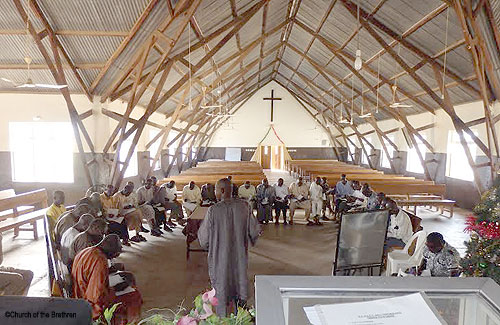
Several hundred people have taken part in trauma healing workshops. A peace and democracy conference was held before the elections, among the efforts going on to promote peaceful co-existence between Christians and Muslims.
In the area of livelihoods and economic sustainability, seeds and farming implements will be distributed at the care centers as displaced people relocate there and begin farming. Gifts of small businesses have been provided to 200 families. Training in computer skills, sewing and knitting are underway at Skills Acquisition Centers.
Many children have returned to school, but education is not free for Nigerians so crisis response funds have been used to help displaced children pay for school fees, uniforms, and books, and also to pay teachers’ salaries. Some 60 orphans also are being cared for on a full time basis.
Much has been done to keep EYN functioning as a church despite the destruction of many of its congregations and most of its district infrastructure, as well as the need for its headquarters to relocate to central Nigeria. A new annex has been set up for the EYN Headquarters, and the building has been remodeled and reroofed. Housing has been obtained for all the denominational leaders and their families, and staff quarters are being built. A warehouse with storage space and housing for the relief staff has been purchased. An existing school property is being prepared to relocate Kulp Bible College. In addition, crisis response funds also have been used to help EYN hold its annual Minister’s Conference and Majalisa (annual meeting) this year.
EYN has hired seven staff to work on the relief effort, and has purchased two passenger vehicles and a large truck as well as equipment for the relief office. Also included in the Nigeria Crisis Response budget are the administrative costs of all the Nigerian NGOs that are part of the effort.
For more information about the Nigeria Crisis Response, go to www.brethren.org/nigeriacrisis .
3) New Humanitarian Pledge to ban nuclear weapons advances as troubled treaty stalls
A World Council of Churches release by Emily Welty and Jonathan Frerichs
The year of 2015 marks the 70th anniversary of the atomic bombings of Hiroshima and Nagasaki. Four weeks of negotiations on nuclear weapons came to a close on Friday, May 22, as the Review Conference of the Nuclear Non-Proliferation Treaty (NPT) ended without a formal agreement.
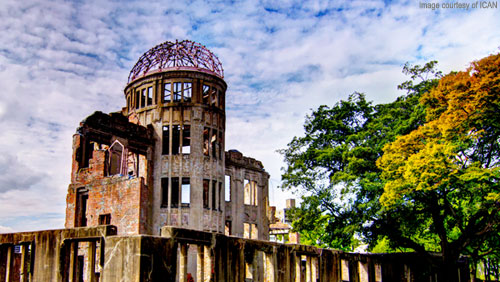
Despite the outcome, a bright new prospect towards a world without nuclear weapons has emerged in the form of a Humanitarian Pledge, now endorsed by 107 states, which promises “to fill the legal gap for the prohibition and elimination of nuclear weapons.” As the few states with nuclear weapons worked to complicate, and many critics say weaken, the NPT review process, more and more governments without nuclear weapons endorsed the new pledge.
Members of the International Campaign to Abolish Nuclear Weapons (ICAN), including the World Council of Churches and some of its member churches, are promoting the pledge in every region of the world.
The divide between nuclear and non-nuclear nations was apparent throughout the NPT conference at the United Nations headquarters in New York. A large group of reform-minded countries told the final session there was “a reality gap, a credibility gap, a confidence gap, and a moral gap.”
The “reality” gap refers to compelling new evidence about the catastrophic humanitarian impact of nuclear weapons. The “credibility” gap refers to the perceived chronic failure of nuclear-armed states to fulfil their treaty obligation to negotiate nuclear disarmament. The “confidence” gap stems from the same states espousing the goal of a nuclear-weapon-free world while modernizing their nuclear arsenals at the cost of hundreds of billions of dollars.
The “moral” gap is especially wide and of particular concern to representatives of the churches. “The nuclear powers at the conference are claiming that their security is worth whatever these horrible weapons risk doing to others,” Olav Fykse Tveit, WCC general secretary, said in a statement issued during the meeting. “That is not acceptable. What nuclear weapons do to people and the planet–to God’s wonderful creation–is immoral, unethical and contrary to the will of God,” he said.
WCC representatives met with diplomats from countries where member churches had contacted their government prior to the meeting. Some WCC member churches sent pre-conference letters to governments stressing the need for a legal ban applying to all nuclear weapons, promoting the new pledge as a step in that direction, and lauding recent joint statements in which 159 countries declare, “Nuclear weapons must never be used again under any circumstances.” The churches said the new humanitarian approach to nuclear disarmament “has done what the NPT has failed to do–empower the majority in their commitment to eliminate nuclear arms.”
The failure of the NPT to produce a consensus document frustrated the many countries that have fulfilled their commitments to refrain from developing nuclear weapons and who expect the nuclear-armed states to fulfil their legal obligation to disarm.
In open sessions and behind closed doors, nuclear powers attempted to block or weaken disarmament measures. France, the United Kingdom, and the United States argued that nuclear weapons provide security and that disarmament must proceed slowly. However, a growing number of states and civil society organizations challenge this rationale and highlight the unacceptable risks that nuclear weapons pose to humanity.
South Africa, which abandoned its own nuclear weapons in the early 1990s, told the conference that states refusing to give up their nuclear arsenals “makes nonsense…of the historic [1970 NPT] bargain that nuclear-weapon states will disarm, whilst others will not proliferate.” South African Ambassador Abdul Minty said, “How long will it take to reach the destination? Do they need some fuel from us to make them go faster, or are they taking rest-stops along the way, or are they simply lost?”
Churches and related organizations in the WCC-led Ecumenical Peace Advocacy Network reminded their governments that this year’s 70th anniversary of the atomic bombings of Japan makes 2015 “a propitious year for real progress on nuclear disarmament.” Arguing in favour of a ban, the churches said, “To ensure that nuclear weapons are never used again, they must be eliminated. To eliminate them, they must be banned.”
“The World Council of Churches and member churches are looking to governments to take decisive action in this memorial year,” the WCC general secretary stated.
The Humanitarian Pledge is a refreshing change amid the habitual misuse of the NPT by a few nuclear-armed states to perpetuate their privileges. It is widely believed the proposed outcome document from the 2015 NPT Review Conference was already weak and did not reflect the broad majority calls for urgent and effective measures for nuclear disarmament. Then the US, the UK and Canada–two of the nuclear powers and one of their allies involved in weakening the document–announced that they would not be able to support it at all. They were acting on behalf of Israel, another nuclear-armed state that is not even a member of the NPT. For decades Israel has refused to enter into negotiations to make the Middle East a Nuclear-Weapon-Free Zone, a critical provision of the treaty that is of great importance in the region.
Several governments decried the current situation as “nuclear colonialism” or “nuclear apartheid” because a small minority of nuclear-armed states control both the NPT process and the nuclear weapons that should be eliminated. However, new hope has emerged in the form of the Humanitarian Pledge which supports a process, open to all and block-able by none, “to stigmatize, prohibit, and eliminate nuclear weapons in light of their unacceptable humanitarian consequences and associated risks.”
During the NPT conference, WCC representatives delivered a multi-religious statement, “Faith Communities Concerned about the Humanitarian Consequences of Nuclear Weapons,” and served as panellists to discuss the NPT’s disarmament obligation, Nuclear-Weapon-Free Zones, and the advocacy role of religious organizations in disarmament processes.
Find the Humanitarian Pledge at www.icanw.org/wp-content/uploads/2015/03/HINW14vienna_Pledge_Document.pdf and a list of countries that have signed it at https://npt.icanaustria.at . More about the WCC advocacy work on nuclear arms control is at www.oikoumene.org/en/what-we-do/nuclear-arms-control .
— This is reprinted from a World Council of Churches release dated May 26. Emily Welty, vice-moderator of the WCC Commission of the Churches on International Affairs, is a university professor in New York City. Jonathan Frerichs is a WCC staff member.
FEATURE
4) Breaking the chains: A reflection from Ecumenical Advocacy Days
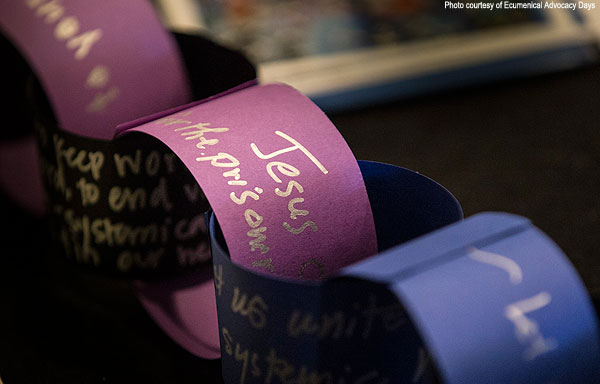
By Sarandon Smith
I don’t often watch the news anymore; it is too frustrating. I read my fair share of articles while scrolling through my Facebook feed that describe just what state of disarray our world is falling toward. There are few things more terrifying than seeing the brilliantly dramatized retelling of the things that are going on around me, and many days it is hard to find comfort in knowing too much about the world that I live in. Some days I cry.
But each day I thank God that I have grown up being nurtured in the Church of the Brethren, a community in which I was raised to know that I am an instrument of change in the world, an instrument that can work to counter the symptoms of societal decay I see happening around me.
I was taught to be a voice for the voiceless and a hand for the helpless, using my voice and abilities to advocate for what I have been called to stand for as a child of God. Comfort is found in this work that advocates for justice and peace, and it reminds me and others that there is hope to be had even when the world seems like a dark place.
I believe that I am called to rise to every occasion which gives me the opportunity to do this work in the world. When Nathan Hosler called and asked if I would want to represent the Church of the Brethren at Ecumenical Advocacy Days in Washington, D.C., it didn’t occur to me to think twice about going to this conference that happened only two weeks before finals. On April 17 I found myself getting in the car at 4 a.m., headed to catch a plane to D.C.
I joined Katie Furrow from the Office of Public Witness in attending Ecumenical Advocacy Days, a weekend-long advocacy conference that calls people of different walks of faith to stand together and advocate for justice. This year the theme “Breaking the Chains: Mass Incarceration and System of Exploitation” was all too fitting with the recent events around our nation, and it eerily prefaced the crisis in Baltimore. Almost 1,000 participants gathered to learn about and discuss in depth the issues within our justice system in the United States, as well as globally.
The Congressional “ask” that we presented to our representatives at meetings on Capitol Hill focused on two major facets. The first was to advocate for a fairer justice system in the United States. More specifically, this involved calling for change and recognizing systemic racism within the US justice system, as well as showing our support for legislation that would allow for smarter sentencing in non-felony cases. Smarter sentencing bills aim to reduce the population of incarcerated nonviolent offenders in the United States, so that we can begin working toward a new justice system that works for rehabilitation instead of simply incarceration.
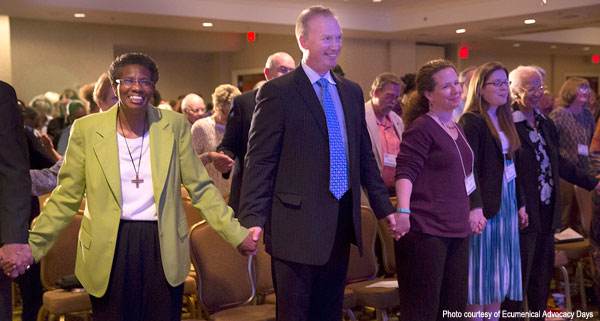
Participants at Ecumenical Advocacy Days 2015
The second facet of our “ask” was calling for reform in our country’s immigration detention policies. Currently the United States has a 35,000 prison bed quota for the number of immigrants that must be detained at any given time in the US. Not only is this system horribly unjust, but it is also costly, with unfathomable amounts of money used each year to detain immigrants, many of whom are not being held for any real cause. This, in turn, supports an industrial prison complex in which private prison companies are making money off of the unjust actions of our government.
The weekend consisted of workshops, plenaries, and discussion panels that provided the opportunity for education, conversation, and advocacy on this issue. And on the day when the group from Ecumenical Advocacy Days went up to Capitol Hill, we approached it in a spirit of faith. We knew that we were going to do the work that we are called to do by our God, which is to advocate for the victims of injustice, promote peace, and work towards a more just and Christ-like world.
Ecumenical Advocacy Days left me energized and educated about a very pressing issue that plagues our society and must be addressed. Not only was I honored to be part of the work being done to advocate for systemic reform of our prison and detention systems, but I returned back to Manchester University in North Manchester, Ind., feeling empowered to speak out about an issue that now had a special place in my heart. In order to move into a bright future for all God’s children, especially minority and marginalized groups, we must become vocal about the issue of mass incarceration and systems of exploitation that are blatantly in opposition to the justice we must work for as followers of Christ and children of God.
I would like to say a special thank you to Nathan Hosler and Katie Furrow for inviting me to Ecumenical Advocacy Days, and making it possible for me to attend. I also have a heart filled with gratitude for the larger Brethren community that continually enables me to have opportunities through which I can follow God’s call for my life. I am blessed, I am grateful, and I am humbled by the community of which I am part. Let us work together for a more just and Christ-like world.
— Sarandon Smith prepared this reflection from the Ecumenical Advocacy Days, reporting on behalf of the Church of the Brethren Office of Public Witness. For more about the event, go to http://advocacydays.org .
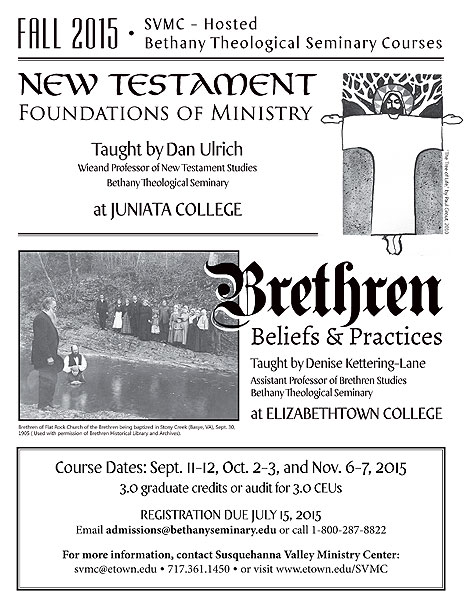
Two courses that offer credit at Bethany Theological Seminary will be hosted by Susquehanna Valley Ministry Center (SVMC) at Church of the Brethren-related colleges this fall. “New Testament Foundations of Ministry” will be held at Juniata College in Huntingdon, Pa., and “Brethren Beliefs and Practices” at Elizabethtown (Pa.) College. Both courses are on Sept. 11-12, Oct. 2-3, and Nov. 6-7. “New Testament Foundations of Ministry” is taught by Dan Ulrich, Wieand Professor of New Testament Studies at Bethany Seminary. “Brethren Beliefs and Practices” is taught by Denise Kettering-Lane, assistant professor of Brethren Studies at Bethany Seminary. Participants may earn 3.0 graduate credits or audit for 3.0 continuing education credits. Registration is due July 15. Contact Bethany Seminary admissions at admissions@bethanyseminary.edu or call 800-287-8822, or contact the Susquehanna Valley Ministry Center at svmc@etown.edu or 717-361-1450 or visit www.etown.edu/SVMC . |
5) Brethren bits
— Remembrance: Gerald Neher, a former Church of the Brethren mission worker in Nigeria, died on May 25 at the Cedars in McPherson, Kan. He and wife, Lois, lived in McPherson since his retirement from teaching. Since the April 2014 abduction of the 200-plus schoolgirls from Chibok by Boko Haram Islamist insurgents, Neher became known for authoring perhaps the only book published in English about Chibok and its people. The book, which Neher wrote with his wife, Lois, also may be the only scholarly study of Chibok society, culture, traditions, and history. The Nehers worked with the Church of the Brethren Mission in Nigeria from 1954-1968, serving in Chibok and at Kulp Bible School. While at Chibok, they helped expand the size of the school building, making it possible for the first girls to attend the school. The Nehers lived and worked in Chibok early in their missionary career, and made a thorough study of those among whom they lived, including numerous interviews. The book, “Life Among the Chibok of Nigeria,” was published in 2011 offering an extensive record of what the Nehers learned about the Chibok during their time there. They “listened to the elders speak about their land, their lineage, their ethos, their farming, religious beliefs, kinship, and much more,” according to a description of the book, “so that the Chibok people would have a record of their past and their present as devastating changes have overtaken them.” A follow-up book featured photographs of the people of northeast Nigeria, under the title “Glimpses of Life in Northeast Nigeria 1954-1968,” and was published in 2014. After the abductions of the Chibok schoolgirls, the Nehers were interviewed by Michael Daly for “The Daily Beast.” In the interview, “We Built a School in Boko Haram’s Heartland,” Daly noted that “the very opposite of terrorists arrived in Chibok more than a half-century before the world came to know this remote Nigerian village as the place where maniacal members of Boko Haram kidnapped more than 270 girls and burned down their school. While the terrorist group struck in recent days intending only evil, Gerald and Lois Neher of Kansas came to Chibok in 1954 with the purpose of doing as much good as they were able. They helped make it possible for girls to attend school there in the first place.” See www.thedailybeast.com/articles/2014/05/13/we-built-a-school-in-boko-haram-s-heartland.html . A memorial service for Gerald Neher is planned for Saturday, May 30, in McPherson.
— Kathleen Nofziger Yeakey of Goshen, Ind., has been named executive director of the Anabaptist Disabilities Network (ADNet). The Church of the Brethren Congregational Life Ministries is one of the partners in ADNet. Nofziger Yeakey has more than 20 years of experience working in development and public relations with non-profit organizations, and also is executive director of Chain Reaction Bicycle Project Inc. in Goshen, a community bicycle shop and bicycle transportation advocacy organization. She is a member of North Goshen Mennonite Church. She began working half-time in ADNet’s office in Elkhart, Ind., on May 18. Organized in 2003, ADNet is an advocacy ministry committed to supporting congregations, families, and persons touched by disabilities, and nurturing inclusive communities. Rebekah Flores serves as the Church of the Brethren ADNet associate. Contact ADNet at 877-214-9838 or adnet@adnetonline.org or visit www.adnetonline.org .
— The Brethren Academy for Ministerial Leadership seeks a coordinator of Spanish Language Ministry Training Programs for the Church of the Brethren, to fill a quarter-time position. The primary functions of the position are to administer the Seminario Biblico Anabautista Hispano (SeBAH-CoB) educational program, design and administer the new Spanish-language track of the Education for a Shared Ministry (EFSM) educational program, and work with various constituencies to provide leadership for Spanish-language ministry training programs. Interested candidates should possess the following qualifications and abilities: five years of effective leadership in pastoral ministry, ordination in the Church of the Brethren, fluency in Spanish and English both in oral and written communicatio, a master of divinity degree, a record of regular continuing education experiences, residence in Richmond, Ind., or the surrounding area preferred. A more complete job description is available from the executive assistant to the president. Applications will be received and reviewed immediately, and will be accepted until the position is filled. Send a resume, letter of interest, and contact information for three references to: Shaye Isaacs, Executive Assistant to the President, Bethany Theological Seminary, 615 National Road West, Richmond, IN 47374; or by e-mail to isaacsh@bethanyseminary.edu . The Brethren Academy for Ministerial Leadership is a ministry training partnership of the Church of the Brethren and Bethany Theological Seminary.
— The last webinar in the “After Christendom” series for 2014-15 is offered on June 2, from 2:30-3:30 p.m. (Eastern time). The webinar titled “God After Christendom?” is based on a book by the same name. Authors and webinar presenters Brian Haymes and Kyle Gingerich Hiebert will discuss why Christians cannot sustain a life of peacemaking and discipleship without talking about God, said an announcement of the event. “Haymes and Gingerich Hiebert are committed to radical practice and show how the great tradition of Western theology enables this. Humbly and biblically they think about suffering in light of the Christlike God and peacemaking in light of the Trinity. Haymes and Gingerich Hiebert give participants new (old) language to talk about the God, who is known in history and mystery, wonder and worship, and above all in Jesus Christ.” The webinar is free. Ministers who attend the live session may earn 0.1 continuing education credit. Registration is at www.brethren.org/webcasts . For more information contact Stan Dueck, director of Transforming Practices for the Church of the Brethren and a member of the Congregational Life Ministries staff, at 800-323-8039 ext. 343 or sdueck@brethren.org .
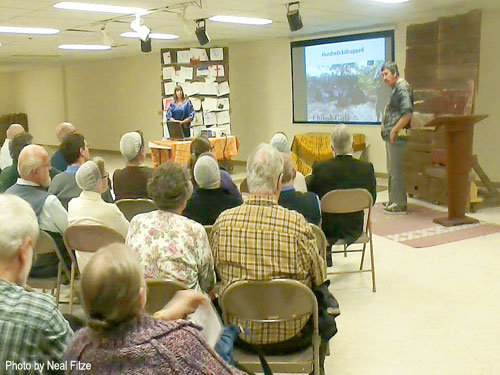
Carl and Roxane Hill gave presentations about Nigeria Crisis Response to audiences in Ohio in late April. The Hills were hosted by Troy (Ohio) Church of the Brethren and the Brethren Heritage Center in Brookville, Ohio, on April 29-30.
— Nigeria Crisis Response co-directors Carl and Roxane Hill were hosted by Troy (Ohio) Church of the Brethren and the Brethren Heritage Center in Brookville, Ohio, on April 29-30. The Hills recently returned from working with Ekklesiyar Yan’uwa a Nigeria (EYN, the Church of the Brethren in Nigeria) and “spoke of their observations of conditions among our Brothers and Sisters in Nigeria,” reported Larry Heisey. The Hills’ presentations reviewed the situation in northeast Nigeria where the Boko Haram Islamist insurgency has carried out violent attacks against communities in which many of the one million-plus EYN members and other Christians and moderate Muslims lived. Those at the Ohio gatherings learned of the effects of the violence on the Nigerian church, including the burning of church buildings, the killing of pastors and other members, the kidnapping of women and children, and how the violence has driven many thousands of people into the central and southern parts of Nigeria seeking refuge. “Attendance at these two events totaled approximately 135,” Heisey reported. “Approximately 60 people were treated to a typical Nigerian dinner at the Brethren Heritage Center, prepared by John and Pat Krabacher, New Carlisle Church of the Brethren, prior to the evening program. Donations to the Nigerian Crisis Fund from the two events totaled over $2,800. We continue to pray for our EYN Sisters and Brothers as they cope with this crisis.”
— Bethany Theological Seminary will be offering “Explore Your Call,” a program for high school students, on July 24-Aug. 3 on the seminary’s campus in Richmond, Ind. “Students have the opportunity to study theology in the classroom, then head out into the world to shadow pastors and do real-life ministry,” said an announcement. “Faith and vocation will be explored through a combination of classes taught by Bethany professors, congregational visits, service projects, personal and spiritual enrichment, and recreation. All qualified applicants will receive a full scholarship to Explore Your Call. The only cost to participants is their transportation to and from Richmond,” the announcement said. For more information and an online application see www.bethanyseminary.edu/eyc .
— On May 21, Emily James began a bicycle trek as part of an ongoing On Earth Peace campaign “3,000 Miles for Peace.” Previously, On Earth Peace staff member Bob Gross trekked 3,000 miles for peace by foot as the first effort in the campaign. “3,000 Miles for Peace” honors the late Paul Ziegler, and his commitment to peacemaking. Ziegler was a McPherson (Kan.) College student who had a dream of biking across the country for peace, but tragically died in a bicycle accident before he got the chance to make his journey.
— Christian musician and singer/songwriter Ken Medema will present the Sunday morning worship service at York (Pa.) First Church of the Brethren on May 31 at 10:30 a.m. Medema has been a popular presenter at Church of the Brethren conferences over the years, appearing at several National Youth Conferences, and is one of the major presenters at this year’s Annual Conference in Tampa, Fla., in July. “All are welcome!” said an invitation from York First. A free-will offering will be taken during the service.
— Madison Avenue Church of the Brethren in York, Pa., hosts a benefit event to raise funds for the Nigeria Crisis Response on May 31, at 7 p.m. “Come for an evening of Praise and Worship led by the Madison Avenue Praise Team and Friends,” said an invitation. “We will lift our voices to praise our Lord and Savior, and we will join together in prayer and giving generously in a free will offering for our Brothers and Sisters in Nigeria.”
— An afternoon of “fun, food, faith” was held by the Sugar Valley Church of the Brethren Youth Group in Eastville, Pa., to raise funds and awareness about the crisis in Nigeria.
— June 13, at 6 p.m., is the 2015 Kick Off Banquet for the Brethren Disaster Relief Auction. The family style dinner and concert will be held at Yoder’s Restaurant in New Holland, Pa., featuring the Tribute Quartet.
— Pacific Northwest District’s disaster response ministry is planning a summer “build” to construct two houses near Brewster, Wash. They will replace homes that were totally destroyed in the Carlton Complex Fire last summer. Volunteers are needed. Housing and meals are provided. Contact Frosty Wilkinson at frostyw1@yahoo.com .
— On June 6, guests are invited to “Sip Back and Enjoy” at Camp Eder’s third Tea-Lightful Celebration. The camp is located near Fairfield, Pa. The tea is from 12 noon-3 p.m. Cost is $35 per person. Men and women and youth age 12 and older are welcome. The event features afternoon tea with inspirational speaker Sharon Weisser and live music performed by Celtic Harpist Sharon Knowles. Please bring your own tea cup. The tea will consist of several homemade courses including salad, scones, savory, and a sweet course, and three different types of tea served throughout the afternoon. There also will be vendors and door prizes. Contact the camp at 717-642-8256.
— Five students at Bridgewater (Va.) College are receiving 2015 Summer Christian Experience Scholarships to spend 10 weeks working at Church of the Brethren camps. According to a release, each student was awarded $2,800 from the scholarship program. Receiving scholarships are: Emely D’Oleo, a freshman biology major with a minor in Spanish and the daughter Mr. and Mrs. Daniel D’Oleo of Roanoke, Va., who will serve at Camp Bethel in Fincastle, Va.; Lauren Flora, a freshman communication studies major and daughter of Dawn Flora of Bridgewater, Va., who will serve at Camp Mardela in Denton, Md.; Imani Harris, a sophomore communication studies major and daughter of Rabah Penn of Ashland, Va., and Michael Harris of Smyrna, Ga., who will serve at Shepherd’s Spring in Sharpsburg, Md.; Jacob Potts, a freshman history and sociology double major and son of Martha Tumer of Norfolk, Va., and Mark Potts of Chester, Va., who will serve at Shepherd’s Spring; and Emily Strom, a sophomore liberal studies major from Blacksburg, Va., who will serve at Brethren Woods in Keezletown, Va. The Summer Christian Experience Scholarship Program memorializes a number of outstanding church leaders. It enables students to gain valuable experience and training in various forms of Christian ministry while providing useful service to church-related camps. For more about the college go to www.bridgewater.edu .
— Annual Conference moderator David Steele is featured by “Brethren Voices,” the community television program of Portland (Ore.) Peace Church of the Brethren, in its June show. He is interviewed by host Brent Carlson for the 120th monthly television program of “Brethren Voices.” Steele has been involved with the Church of the Brethren his entire life. A graduate of McPherson (Kan.) College and Bethany Theological Seminary, he has held pastorates in California and Pennsylvania and is currently district executive minister for Middle Pennsylvania District of the Church of the Brethren. He will be presiding over the 223rd Annual Conference of the Church of the Brethren. “Brethren Voices has featured the past eight Annual Conference moderators since 2007 when Belita Mitchell, pastor of First Church of the Brethren, Harrisburg, Pa., began a tradition” of being on the show, said producer Ed Groff in a note to Newsline. In May, “Brethren Voices” has featured EcoFaith Recovery, a broad network of faith-based volunteer leaders of the Pacific Northwest who feel that it’s time for bold action to save the Earth and its peoples. Six of the organization’s leaders including Matt Guynn, a staff member of On Earth Peace, discuss the EcoFaith Recovery’s Beyond Fossil Fuels Initiative as it relates to a huge propane terminal proposed for establishment within the city limits of Portland. For copies of these programs, contact Ed Groff at Groffprod1@msn.com . More than 30 community access stations have broadcast “Brethren Voices” and 60-plus programs can be viewed at www.YouTube.com/Brethrenvoices .
— As the tragic situation of conflict in South Sudan moves into its 18th month, the World Council of Churches (WCC) and the South Sudan Council of Churches (SSCC) continue calling for an end to the senseless conflict, the WCC announced in a release. “Human rights are being abused at every level, both on the battlefield and in peaceful areas. People are being killed, raped, and tortured. The humanitarian situation is deteriorating. South Sudan, a rich and fertile land, should be the bread basket of Africa yet instead is relying on foreign aid,” said the release. In a statement issued in Juba on May 26, the SSCC challenged “the military and political leaders of all sides, most of whom call themselves Christians: why are you not listening to the voice of your church leaders, who echo the voice of the ordinary citizens of South Sudan?” The statement also said: “Children are being recruited into armed groups. Looting is endemic. People are being arrested for no reason. Security organs appear to be acting as if they are above the law. The space for citizens and civil society to speak out appears to be narrowing.” The church leaders concluded their statement: “We will take more proactive steps to try to achieve peace and reconciliation for the people of South Sudan. Any long term solution to the conflict must take account of the needs of the ordinary people, not the agenda of the political and military elite.” Commented WCC general secretary Olav Fykse Tveit, “The church leaders are playing a significant role to bring peace to South Sudan. The churches are representing the people and the civil society and they speak the truth and the true will of all the people of a real and just peace for South Sudan…. Together as the South Sudan Council of Churches and the World Council of Churches, we will convey the message we have as one worldwide fellowship of churches: Stop the war!” Find the May 26 statement from the South Sudan Council of Churches at www.oikoumene.org/en/resources/documents/general-secretary/joint-declarations/statement-from-the-south-sudan-council-of-churches-on-the-deteriorating-situation-in-south-sudan .
— Groups opposed to gun violence are inviting supporters to wear orange on June 2 to symbolize support for life and to honor those whose lives have been destroyed by gun violence. “Orange is the color hunters wear to alert other hunters they’re there. It’s a color that symbolizes the value of human life,” said an announcement. June 2 has been designated National Gun Violence Awareness Day. The effort is being led by Everytown for Gun Safety
Contributors to this Newsline include Chris Douglas, Glen Draper, Stan Dueck, Debbie Eisenbise, Erika Fitz, Maurice Flora, Jonathan Frerichs, Ed Groff, Christine Guth, Larry Heisey, Carl and Roxane Hill, Lois Kruse, Sarandon Smith, Emily Welty, Roy Winter, Jay Wittmeyer, and editor Cheryl Brumbaugh-Cayford, director of News Services for the Church of the Brethren. The next regularly scheduled Newsline is set for June 2. Newsline is produced by the News Services of the Church of the Brethren. Contact the editor at cobnews@brethren.org . Newsline appears every week, with special issues as needed. Stories may be reprinted if Newsline is cited as the source.